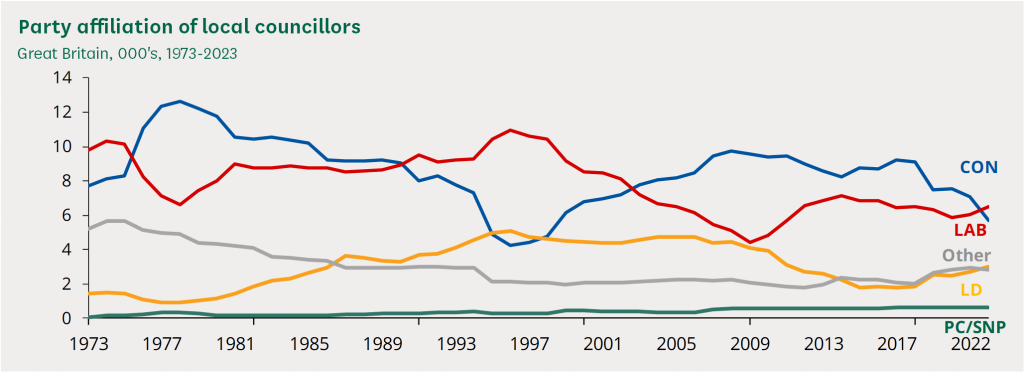Return to Multi-party system? Analysis of minor party roles in the UK
Introduction
The way in which the British party system can be defined has always been contested, whether it is the single, two, two and a half or multi-party system. Recent trends in British politics have indicated a resurgence in the latter, the multi-party system. Under the structure of the voting system, first-past-the-post, the Labour and Conservative parties have been able to dominate parliament, but the 2010 Liberal-Democrat coalition and the countless seats lost by the main parties in by-elections to independent candidates, indicates a change in the traditional landscape of party politics.
The two-party system and identity politics
The diminished faith in the main parties, Labour and the Conservatives, is credited to several factors, the most significant being the onslaught of scandals both parties have experienced in the last decade. These include lobbying scandals, for instance, David Cameron’s use of private connections to lobby for Greensil Capital for his own monetary gain but then being reinstated into Rishi Sunak’s cabinet as foreign secretary gave the public the impression that party members are not held to account (BBC, 2021). MP’s expenses scandals have also tarnished both parties’ reputations alongside accusations of misconduct that because of social media have become better documented than in the past. Scandal has eroded public trust in the main parties and popularised phrases like ‘out of touch’ and ‘political elite’ which presents the gap created between voters and the dominant parties (Yougov, 2024). Public trust has also decreased because voters perceive the main parties as more concerned with internal party affairs rather than public service and delivering policy commitments. Minor parties are therefore an alternative for voters who have become disillusioned by the current two-party system. Minor parties are furthered strengthened by the newfound popularity for single-issue politics in the UK which has arisen due to frustration with ‘catch all’ politics which the main parties practice and fail to deliver. Single issues are more engaging to voters as shown in the Rochdale by-election wherein George Galloways championing of the Palestinian cause resonated with the Muslim population in the constituency who felt blindsided by labour and the conservatives, leading to election success for the British worker’s party (BBC, 2024).

Media
The change that media has undergone in the digital era has contributed to the resurgence of the multi-party system in the UK. With the creation and popularity of digital media platforms and increasing obscurity of traditional media, minor parties have gained a voice that they were previously denied. Independent candidates like the afore mentioned George Galloway, and small parties have gained visibility to the public and are now able to engage with voters directly. Previously, Labour and the Conservatives dominated traditional media like print media and television because of party connections and resources party funding allows them (Cooke, 2005, p.33). Social media acts as a tool for minor parties to utilise the algorithm to their advantage by appealing to niche audiences who share their views through targeted online campaigns (Russmann, 2022, p.266). Minor parties are therefore brought to the forefront of UK politics by appealing to voters that feel disconnected from mainstream politics and disillusioned by the two mains parties ‘catch all’ tactics. Grassroots support has become attainable for smaller parties through modern media by bypassing the barriers traditional media placed during election time and has contributed to the revival of multi-party politics.
Regional and identity politics
Regional party success is further proof of a return to the multi-party system. Since the introduction of devolution in the UK, nationalist sentiments have grown in the regions and voters have become dissatisfied by the major parties in Westminster. Westminster, as argued by the electorate, have failed to prioritise the devolved regions when it comes to effective policy and so parties like the Scottish national party and Plaid Cymru have gained regional popularity. Nationalist parties are felt by voters to be better suited at advocating for devolved interests and cultural preservation whilst aligning more closely with the policy preferences of the regional population due to increased proximity and communication (MansBach, 1973, p.186). Events such as Brexit have also spurred on the rising popularity in regional parties as in Scotland, where the country voted remain, Scottish voters were forced into a transition out of the European Union, which contributed to more dissatisfaction with Westminster and a growth in popularity for the SNP.
Conclusion
In conclusion, there is enough of a shift to the British political landscape that justifies claims to a resurgence in the party system. Factors such as changing media, demographics and disillusionment with the mainstream parties has caused this shift towards increased representation for minor parties. As independent candidates and smaller parties gain more visibility to voters, they challenge the traditional dominance the two main parties hold in parliament. With a multi-party system, a broader spectrum of interests can be represented thus ensuring a more pluralist environment for the UK electorate.
Bibliography
BBC (2021). David Cameron and Greensill: What’s it all about? BBC News. [online] 12 Apr. Available at: https://www.bbc.co.uk/news/uk-politics-56578838.
BBC (2024). Rochdale by-election: Landslide win for George Galloway. BBC News. [online] 1 Mar. Available at: https://www.bbc.co.uk/news/uk-politics-68443430 [Accessed 5 Mar. 2024].
Cooke, M. (2005). Do Britain’s journalists have too much power and too little responsibility? RSA Journal, 152(5515), 32–35. http://www.jstor.org/stable/41379541
Mansbach, R. W. (1973). The Scottish National Party: A Revised Political Profile. Comparative Politics, 5(2), 185–210. https://doi.org/10.2307/421240
YOUGOV (2024). Are members of Parliament out of touch? [online] Available at: https://yougov.co.uk/topics/politics/trackers/are-members-of-parliament-out-of-touch.